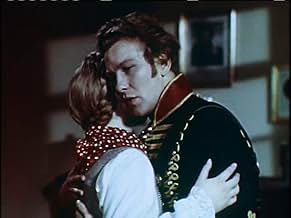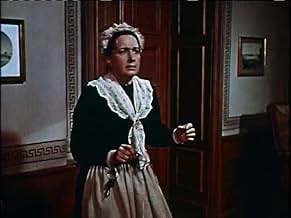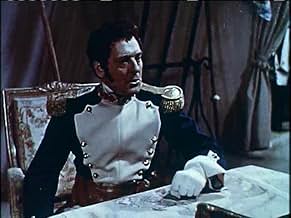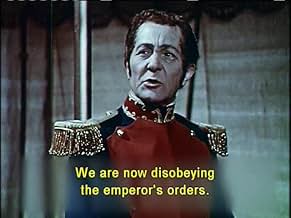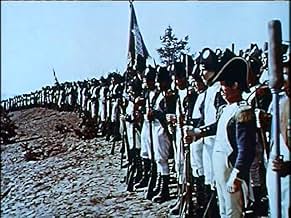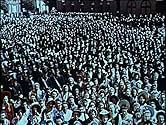Füge eine Handlung in deiner Sprache hinzuDuring Napoleon's German campaign, the city of Kolberg is isolated from Prussian forces. Residents organize resistance against the French army besieging and bombarding the city, refusing to ... Alles lesenDuring Napoleon's German campaign, the city of Kolberg is isolated from Prussian forces. Residents organize resistance against the French army besieging and bombarding the city, refusing to surrender.During Napoleon's German campaign, the city of Kolberg is isolated from Prussian forces. Residents organize resistance against the French army besieging and bombarding the city, refusing to surrender.
- Zaufke
- (as H.H. Schaufuss)
- Fanselow
- (as F. Schafheitlin)
- französischer Offizier
- (as St. Germain)
Empfohlene Bewertungen
Then, Kolberg hadn't fallen when this film premiered in Berlin and La Rochelle (which, perhaps inspired by the film, capitulated only two days after Germany had fallen). Kolberg was finally abandoned on March, 18.
There is a beautiful restored print sold by the International Historic Films. It has beautiful colours and a good soundtrack, plus some extras. This film can be watched - and indeed enjoyed - as a work of art, unless you absolutely want to read propaganda into it. Sure, it was made as an ultimate propaganda vehicle, but as a viewer I am permitted to distance myself from the politics and see this film as a cinematic near masterpiece. We know, that it was radically edited in January 1945, since Dr Goebbels found it to be too bloody, "nearly pacifistic". Every trace of human suffering (aside from the lame love intrigue) was removed, and that's probably what makes this film uneven and jumpy at times. What the director's cut could have looked like, we can only guess.
Politics and propaganda are as important today as they were back then. It's important to remember the atrocities of war and the crimes of Nazist regime. But a film starts living its own life since the moment it's completed, and we are stupid if we fail to recognize its merits merely because we know, that we are supposed to be blind to them.
The story of the movie is not all that important... What matters is the great heinrich george, the rich colours, the hateful atmosphere of the movie - and the tragedy of reality as a background: Shortly after the making of "kolberg" was finished, germany was finished either:
The movie has a romantic perspective on a reactionary, aggressive, irrational and leader-oriented ideology... Not too far away from John Wayne, though I find him very entertaining as a green beret, either.
Goebbels film studios managed to film and distribute this movie just as the final battles of World War II were being fought. Its message of defiant defense in the face of hopeless odds was meant to rally the severely demoralised Germans as their homes were being threatened by the enemy. The songs and vivid colours were meant to entertain and raise morale as life became darker and darker.
Technically, its a masterpiece, and makes use of all kinds of modern shots, angles, and special effects. Its colours were terrible, though, but I trust it was the copy I saw. Of course, it might have been a result of the war constraints.
Seen in this context, this film is even more interesting than the entertaining story it presents.
Jurched
Wusstest du schon
- WissenswertesFeatured 15,000 to 20,000 actual German troops in the battle scenes, even as Germany's eastern and western fronts were collapsing. The director tried to make the shooting longer to save them from being sent to the front.
- PatzerSaxony didn't separate itself from the Holy Roman Empire. It was separated after the Rheinbund was founded in 1806, to which Saxony was included later. Also, in the movie the inclusion of Saxony is mentioned by King Franz II. In real life it didn't happen until December, almost four months after Franz's resignation.
- Zitate
Bürgermeister Nettelbeck: [after Gneisenau asks Nettelbeck to surrender] You weren't born in Kolberg, Gneisenau. You are put here to Kolberg. But we grew up here. We know every stone, every corner every house here. We don't let go. Even if we have to claw in the ground of our city with our nails, we don't let go. First they have to cut off each of our hands or kill us one after the other. Gneisenau, you can't put the whole disgrace on an old man like me. and to give our city to Napoleon. I even promised our king: rather be buried below the ruins that capitulate. Gneisenau, Gneisenau, I never stand on my knees for anyone, now i'm doing it: Kolberg can't be given up, Gneisenau!
Gen. Gneisenau: That's what I wanted to hear from you, Nettelbeck. Now we can die together.
- VerbindungenEdited into 30. Januar 1945 (1965)
- SoundtracksEin Volk steht auf
Top-Auswahl
- How long is Burning Hearts?Powered by Alexa
Details
Box Office
- Budget
- 8.800.000 DM (geschätzt)
- Laufzeit
- 1 Std. 51 Min.(111 min)
- Sound-Mix
- Seitenverhältnis
- 1.37 : 1

